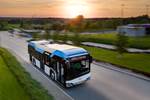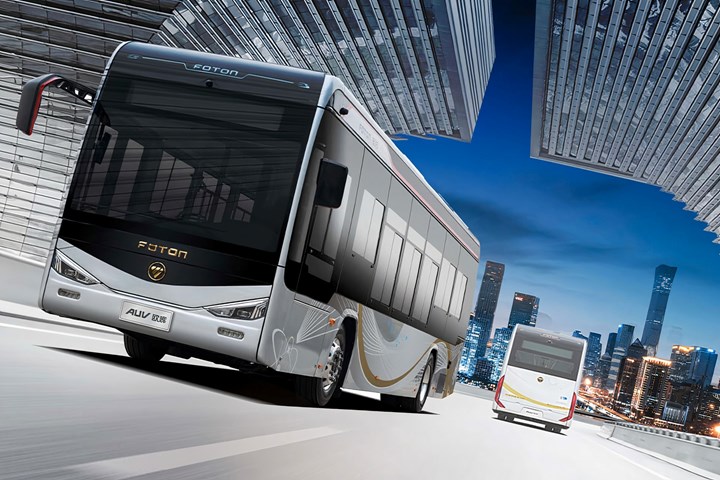Exel Composites supplies fiberglass profiles for Foton electric buses
Partnership with Chinese automotive manufacturer will see the implementation of pultruded profiles in various bus models, backed by weight savings, complex geometries and long life.
Finnish composites manufacturer Exel Composites (Vantaa) has secured a new project with Chinese automotive manufacturer Foton Bus and Coach Co. (Beijing) to supply pultruded glass fiber composite profiles. Per the agreement, signed in February 2024, the glass fiber profiles will be manufactured locally in China, and will be used to reduce the maintenance requirements and weight of Foton’s vehicles, due to composites’ corrosion resistant and lightweight properties. Additionally, the geometric design flexibility of composites will enable wider structural engineering possibilities than traditional metals, such as steel and aluminum.
Foton Bus and Coach Co., a subsidiary of BAIC, manufactures a wide range of commercial vehicles, including trucks, buses, vans and construction vehicles. In line with industry trends, Foton has shifted its focus to electric and hydrogen vehicle manufacturing, particularly in the bus and coach sector.
Exel Composites will produce a series of structural composite profiles for many different bus models. These profiles, including fiber-reinforced plastic (FRP) side panels, skirt panels and fake roofs, are manufactured using pultrusion technology with glass fiber. They offer greater tensile strength and durability while reducing density by 30%, compared to traditional aluminum profiles.
“Exel’s profiles improve our design process in ways that are only achievable with composite materials,” highlights Mr. He, head of group R&D for Foton Bus and Coach Co. “The geometric possibilities are key for complex-shaped structural components, and the weight savings of fiberglass compared to aluminum reduces strain on both the chassis and the battery. What’s more, composite panels don’t rust and can last for decades.”
Kathy Wang, executive VP for industrial solutions business unit at Exel Composites, notes that Exel has refined its pultrusion manufacturing process over many decades, achieving complex geometric profiles that match the strength of traditional aluminum, while remaining light in weight. “At the same time, the finished profile has a smooth surface finish, which eliminates the need for further processing,” Wang says. “Furthermore, unlike aluminum extrusions, which are limited to 0.3 meter in width and require multiple connections for larger panels, our composite profiles can extend up to 1.2 meters wide and 12 meters long. This ensures structural integrity and solidarity.”
Exel Composites can also use pultrusion for applications including interior air ducts, luggage racks, side shields and flooring, as well as pull-winding for small-diameter tubes, further reducing the energy consumption and weight of buses.
For related content, read “Pull-wound fiberglass composite 5G utility poles enable easier, faster installation.”
Related Content
-
SABIC launches fiber-reinforced, intumescent, fire-retardant resins
SABIC PP compound H1090 and Stamax 30YH611 resins are well suited for extruding and thermoforming large, complex EV battery pack components for automotive.
-
Aptera joins forces with C.P.C. Group to accelerate solar EV production
Specialized composite bodies are being produced in Modena, Italy, for Aptera’s BinC vehicle, enabling eventual manufacturing ramp-up of 40 vehicles/day to meet demand targets.
-
Composites end markets: Batteries and fuel cells (2024)
As the number of battery and fuel cell electric vehicles (EVs) grows, so do the opportunities for composites in battery enclosures and components for fuel cells.
















